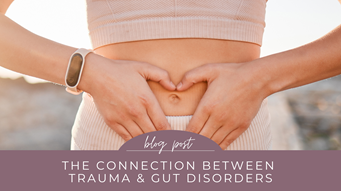As a therapist who specializes in trauma recovery, it is essential to understand the profound connection between trauma and gut health, a relationship that underscores the intricate interplay between our mind and body. This connection is often referred to as the "gut-brain axis," a bidirectional communication network linking the emotional and cognitive centers of the brain with peripheral intestinal functions. Let’s unpack that together…
What is the Gut-Brain Axis?
The gut-brain axis involves multiple pathways, including the central nervous system (CNS), the autonomic nervous system (ANS), the enteric nervous system (ENS), and the hypothalamic-pituitary-adrenal (HPA) axis. These pathways facilitate constant communication between the gut and the brain, affecting everything from mood and behavior to digestive processes.
So what is the impact of trauma on the gut?
Stress Response and the HPA Axis: Trauma often triggers a chronic stress response, activating the HPA axis. This results in the release of stress hormones like cortisol, which can disrupt normal gut function. Prolonged stress can lead to alterations in gut motility, increased gut permeability (often referred to as "leaky gut"), and changes in gut microbiota composition.
Microbiota and Mental Health: The gut microbiota, a complex community of microorganisms living in our intestines, plays a crucial role in our overall health, including mental health. Trauma-induced stress can lead to dysbiosis, an imbalance in the gut microbiota. This dysbiosis is associated with various mental health conditions such as anxiety, depression, and post-traumatic stress disorder (PTSD).
Inflammation and Immune Response: Chronic stress and trauma can cause inflammation in the body. The gut, home to a significant portion of the immune system, responds to this inflammation, which can further affect the gut-brain axis. Increased gut permeability allows toxins and bacteria to enter the bloodstream, leading to systemic inflammation and contributing to mood disorders and cognitive impairments.
So how do we incorporate healing our gut as we recover from our trauma?
Diet and Nutrition: A diet rich in fiber, probiotics, and prebiotics can support gut health and, by extension, mental health. Foods such as yogurt, kefir, sauerkraut, and high-fiber fruits and vegetables help maintain a healthy gut microbiome.
Psychotherapy and Stress Management: Trauma informed, somatic-based therapies like EMDR (Eye Movement Desensitization Reprocessing), Sensorimotor Psychotherapy, mindfulness, and other stress-reduction techniques can mitigate the effects of trauma on the gut-brain axis. By reducing stress levels, these therapies help normalize HPA axis function and support gut health.
Probiotics and Supplementation: In some cases, probiotic supplements may be recommended to restore gut microbiota balance. These can be particularly beneficial for individuals experiencing significant gut-related symptoms due to trauma. Seeing a Functional Nutritionist can be an important support and resource for recovery.
Regular Physical Activity: Exercise has been shown to have a positive impact on both mental health and gut health. Physical activity can reduce stress, promote healthy gut motility, and support a balanced microbiome. This is NOT necessarily intense, high impact workouts but movement that listens to the body’s cues is essential. Walking, yoga, and pilates are all great resources for body gentle body movement.
Understanding the connection between trauma and gut health is vital for comprehensive mental health care. Addressing gut health can play a critical role in the healing process for those who have experienced trauma. We are passionate about integrative holistic healing at Healing Hearts Counseling! By adopting a holistic approach that includes dietary changes, stress management, and therapeutic interventions, individuals can improve both their mental and physical well-being and heal from the inside out!


Comments